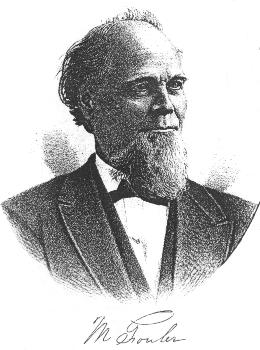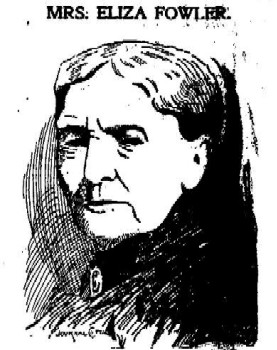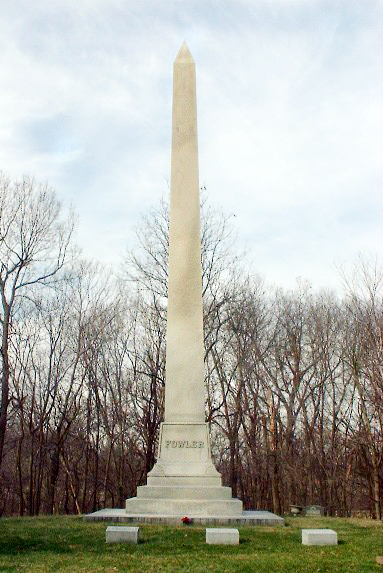 THE
FOWLER FAMILY
THE
FOWLER FAMILY
MOSES FOWLER, the head of the family
of which this memoir
treats,
was unlike the man who slips noiselessly through life,
touching here
and
there only the lesser interests of the community, and
after a quiet,
unobserved
career, steps from the scenes of his activity, to be
missed only by his
immediate family. In the case of MR. FOWLER, his
intense nature
caused
his influence to be felt along almost every avenue of
enterprise and
legitimate
industry within the extensive scope in which he was a
masterly operator
for a long period of time, thus connecting himself
with men of
achievement
who "do things" for their day and generation, and
whose memory is long
cherished for the lasting results which their minds
and hands have
worthily
wrought.
MR. FOWLER was the son
of
SAMUEL and MARY (ROGERS) FOWLER, who were
descendants of the old Revolutionary stock, and were
both reared in
Virginia,
inheriting the patriotic pride of the Old Dominion
commonwealth.
The father was a soldier in the Revolutionary
struggle, and both
parents
removed to Ohio before the birth of their son.
MOSES, the
chief
subject of this biographical memoir, was born near
Circleville,
Pickaway
County, Ohio, April 30, 1815, and remained on his
father's farm until
sixteen
years of age, assisting his father summers and
attending school during
the winter months. He next went to Circleville
to learn the trade
of a tanner, under the direction of JAMES BELL, who
owned an extensive
tannery at that point. After serving two years,
MR. BELL was so
impressed
with the young man's ability and business foresight
that he wanted him
as a partner in the business, but this offer young
FOWLER respectfully
declined, preferring a clerkship which was tendered
him in a dry goods
store belonging to an excellent businessman at
Adelphi, Ross
County.
There he remained about three years, mastering the
business and saving
his earnings.
The spring of 1839
marked a
new era in the life of MR. FOWLER, who
was then twenty-four years of age, in the prime of his
young manhood
and
entering the doorway of an eventful life. At
that date he, in
company
of JOHN PURDUE (founder of Purdue University in later
years), removed
to
Lafayette, Indiana, where they established a store of
their own.
The only capital MR. FOWLER then possessed (and a part
of that was
borrowed)
was seven hundred dollars. During the five years
following the
foundations
of the future fortunes of both these young men were
laid. At the
termination of this partnership, MR. FOWLER embarked
in a similar
business
on his own account, in his own room, on what is now
the corner of Main
and Second streets, Lafayette. So great was his
success that at
the
end of a half dozen years he was able to close out his
store and become
an equal partner with WILLIAM F. REYNOLDS and ROBERT
STOCKWELL, under
the
firm name REYNOLDS, FOWLER & STOCKWELL, in the
wholesale grocery
business,
which at that date required no little capital.
MR. FOWLER managed
the business largely, and purchased the great bulk of
the goods.
For seven years this firm conducted the leading
wholesale grocery house
in Indiana. Although Lafayette was then but a
small village, it
was
the terminus of the Wabash & Erie Canal, as well
as at the head of
navigation on the Wabash River. They had a trade
extending over a
radius of more than one hundred miles. So
prodigious was their
trade
that they frequently chartered a whole fleet of
steamboats to transport
their southern supplies, including sugars, syrups,
molasses, coffee,
rice,
etc., from New Orleans. The Wabash River then
allowed steamboats
of the largest magnitude to ply its waters as high up
as
Lafayette.
Many times from six to eight of these boats might have
been seen
unloading
at the Lafayette wharf. With large sales and
good profits, MR.
FOWLER,
at the end of a few years, had accumulated a handsome
competency and
retired
from this line of business. However, he had not
ended his career
as a business factor in Indiana, for he had really but
laid his
foundation
deep and strong for his future operations.
Two years after his
arrival in
Lafayette, MR. FOWLER was made one
of the directors of the old Indiana State Bank, which
position he held
until the bank closed up its business.
Subsequently, and after
the
organization of the Bank of the State, HON. HUGH
McCULLOUGH, supervisor
of all the banks in the series throughout the entire
state, selected
MR.
FOWLER to organize the branch at Lafayette, with a
capital of
$300,000.
The stock was speedily taken and he was made president
of this
branch.
This system of banking in Indiana existed for eight
years, during which
time MR. FOWLER was a delegate to the Bank Board,
which held its
sessions
at Indianapolis and which had charge of all the banks
of the branch
character
within the state. With one exception, the
Lafayette branch was
the
most successful of all these banking houses. It
was finally wound
up to the profit and entire satisfaction of all
concerned.
In 1865 MR. FOWLER
secured a
charter from the United States government
to organize the National State Bank of Lafayette, with
a capital of
$600,000,
and of which he was made president. This was
even a greater bank
and succeeded far beyond the operations of the former
bank which he had
been at the head of. The charter of the bank
expired in January,
1885.
Thus MR. FOWLER had
been in
one way or another connected with the
banking business for about thirty years, and desired
to retire from the
cares and perplexities of the business which had grown
to such a
magnitude,
but when this desire was made known to those with whom
he had long been
associated, they stoutly protested and wanted him to
organize a new
banking
house in Lafayette. Chiefly to gratify his old
stockholders, he
consented
to do so. He was finally led to this step, at
the instance of his
old-time cashier, BROWN BROCKENBROUGH. He
organized the National
Fowler Bank of Lafayette, a small national bank of
only $100,000
capital,
the stock of which he chiefly held himself. But
instead of
reducing
his business and accompanying cares, he in reality
increased it.
His honor as a banker was everywhere known; no one
cared what the
advertised
cash capital of the new bank might be so long as he
was at its
head.
Deposits soon reached the $1,000,000 mark, a sum equal
to all other
national
banks in Lafayette. Its growth and financial
success and profits
were indeed phenomenal. Had he left no other
monument to his
great
business ability than this banking concern it were
sufficient to
preserve
his name in the minds of the coming generations.
But not alone in the
roll of
a banker did this man succeed.
In 1861 - the first year of the Civil War period - he
organized the
firm
of CULBERTSON, BLAIR & COMPANY, of Chicago, of
which he became a
member.
This was a firm engaged extensively in the slaughter
of cattle and
hogs,
doing a general meat packing business. It was
next to the largest
plant in that line of business in the entire
West. After eight
years,
MR. FOWLER withdrew from the firm, selling his share
for
$250,000.
But his business tact and tendency still urged him on
in the direction
of other large conquests. The next speculation
was the purchase
of
large tracts of unimproved lands, in company with
ADAMS EARL,
Esq.
Their plan was to put large droves of cattle on these
lands, and after
partly subduing the land then make farming tracts of
it. These
lands
were located in Benton County, Indiana. After
12,000 acres had
been
purchased, under the first arrangement, MR. FOWLER
preferring to be
sole
owner in the business conducted it on his own account,
he having
divided
the former lands with his partner. He continued
to purchase lands
in this county, until he owned in his own right, and
in the very heart
of the rich county, 20,000 acres. After having
thus secured these
lands, he set about the building of a railroad through
the same, which
line of highway should connect his interests with the
great cities of
Chicago
and Cincinnati, his lands being one hundred miles
southeast of
Chicago.
He had already had some railroad experience, having
been one of the
directors
of the Cincinnati & Lafayette Railway
Company. This knowledge
was now to serve him a good turn. He, with two
other men,
organized
a company and constructed the Cincinnati, Lafayette
& Chicago
Railroad,
since known as the Kankakee Short Line, being the most
important link
in
the "Big Four" system between Chicago and
Cincinnati. The
next
stroke of business diplomacy was to move the county
seat from Oxford to
the town of Fowler, in the center of the county where
his landed estate
was situated. This was soon accomplished, MR.
FOWLER donating
$40,000
to Benton County for courthouse purposes and
additional grounds for
buildings.
By this improvement, including the construction of the
railroad, Benton
County was made a county of value and importance,
while up to the day
of
this transformation it had been one of the most
valueless, backwoods
districts
within Indiana. He verily made the waste places
blossom like the
rose.
Besides the lands
already
specified in the narrative, MR. FOWLER
owned immense tracts in Warren County, adjoining; also
in White
County.
In these two counties he owned fully 25,000 acres of
land. In
1886
these lands were valued at an average of $50 per
acre. For more
than
a decade he, with WILLIAM S. VAN NATTA, business
manager, was engaged
in
the cattle business on these lands. The
droves contained
2,000
head of fine cattle, which eventually found their way
to the markets of
Chicago and the far East. Among these cattle
were to be found
about
500 head of the finest Herefords in the United
States. On these
broad
acres MR. FOWLER had about 10,000 acres planted
annually to corn, oats
and other crops. His pastures were carpeted with
as fine a growth
of blue grass as ever graced the soil of the famous
Kentucky blue grass
district. It will go almost without saying that
MR. FOWLER became
one of, if not altogether, the wealthiest citizen of
Indiana.
With all of his
immense
business operations, MR. FOWLER never shirked
his obligations as a loyal citizen of the county,
state and
nation.
In his politics, he was originally a Whig, tried and
true in
principle.
When the Republican party was formed he became one of
the pioneer
members
and, while never allowing his name to be up for public
office, he ever
aided the cause of the political party of his
choice. In the dark
days of the great Rebellion he aided his country
mightily by both means
and personal influence. Too old to enter the
ranks of the Union
army
himself, he sent a substitute who carried the musket
three and more
long
years. GOV. LEVI P. MORTON found in him a wise
counselor and
confiding
friend. While a man of affairs and largely
absorbed, it might
seem,
with secular matters, yet he ever did his duty as a
Christian
gentleman,
he having been connected with the Presbyterian church
from his early
manhood.
In Lafayette he was a worthy member of the Second
Presbyterian church
and
for almost thirty years was a trustee in that
church. He was also
a trustee of the Wabash College for a quarter of a
century. He,
with
a few men, donated bank stock to the sum of $30,000 to
be used for the
support of this institution.
MR. FOWLER was married
in
1843 to ELIZA HAWKINS, daughter of JAMES
and SUSANNAH

(JONES) HAWKINS. MRS. FOWLER's paternal
grandfather was BENJAMIN
HAWKINS, of English ancestry. JAMES HAWKINS
moved to Ohio from
South
Carolina, with his parents, who located in Butler
County when he was a
mere lad. The date of his birth was January 8,
1788. The
date
of his death was December, 1850, his widow surviving
him five
years.
Politically he was a Whig, and in religious faith both
he and his good
wife were members of the Society of Friends. He
became a pioneer
in Tippecanoe County in 1829. He was the father
of eleven
children,
MRS. FOWLER being one of the daughters. MR. and
MRS. MOSES FOWLER
were the parents of five children--three daughters and
two sons.
Two died in infancy. They were as follows:
ANNIS, who married
FRED
S. CHASE (eldest son of H.W. CHASE, of Lafayette), a
graduate of Yale
College
and an attorney of Lafayette. This daughter,
MRS. CHASE, died
about
1885, leaving a son whom, in honor of her father, she
named
FOWLER.
The other daughter, OPHELIA, married CHARLES H.
DULEME, of Cincinnati,
now dead. The son, JAMES FOWLER, after he
obtained his education,
was associated with his father in business. More
concerning the
son
will appear elsewhere in this work.
Pre-eminently a
self-made man,
MOSES FOWLER forged his way steadily
to the front rank of industrial men of his
times. He had but a
limited
education, no money with which to commence his
operations, but did
possess
that peculiar genius for accumulating wealth that is
seldom surpassed
in
this country. His judgment was of the best; his
acts were always
on a "square deal" basis, and among his traits of
noble manhood may be
enumerated these--honesty, industry, courage, energy,
and by the
preservation
of his self-control and the observance of a courteous
manner under all
circumstances he was enabled to attain the height of
business
standards,
finally being crowned with ultimate success, and
enjoyed an exalted
power
of influence.
Strange as it may seem,
in all
of his eventful career he never gave
a mortgage on any of his property, save in a case or
two where it was
given
as a matter of form in purchasing some tracts of
land. Again, he
never had but two suits at law, and then he was made
the defendant and
won his judgment against the parties for the
plaintiffs in such
action.
This is all in contrast to such other men who do a
large business on
borrowed
capital, and are made parties to numerous suits at
law, by reason of
their
overreaching and questionable methods of transacting
business with
their
fellow men.
Not only did he make
money
fat during the latter years of his business
career, but he used wealth for the good of his family
and the great
busy
world of men and women less fortunate than
himself. Finally the
end
came and this good man and public benefactor passed to
this rest on
August
19, 1889. He left a widow and two children, and
not only they but
the whole state of Indiana mourned his loss. He
had reached the
advanced
age of seventy-five years. His was truly an
eventful life and a
praiseworthy
career, of which the world has none too many.
Past and Present of Tippecanoe County, Indiana,
Illustrated, Volume
II, pp. 1166-1171
B. F. Bowen & Company, Publishers, Indianapolis,
Indiana, 1909
![]()
![]()

![]()